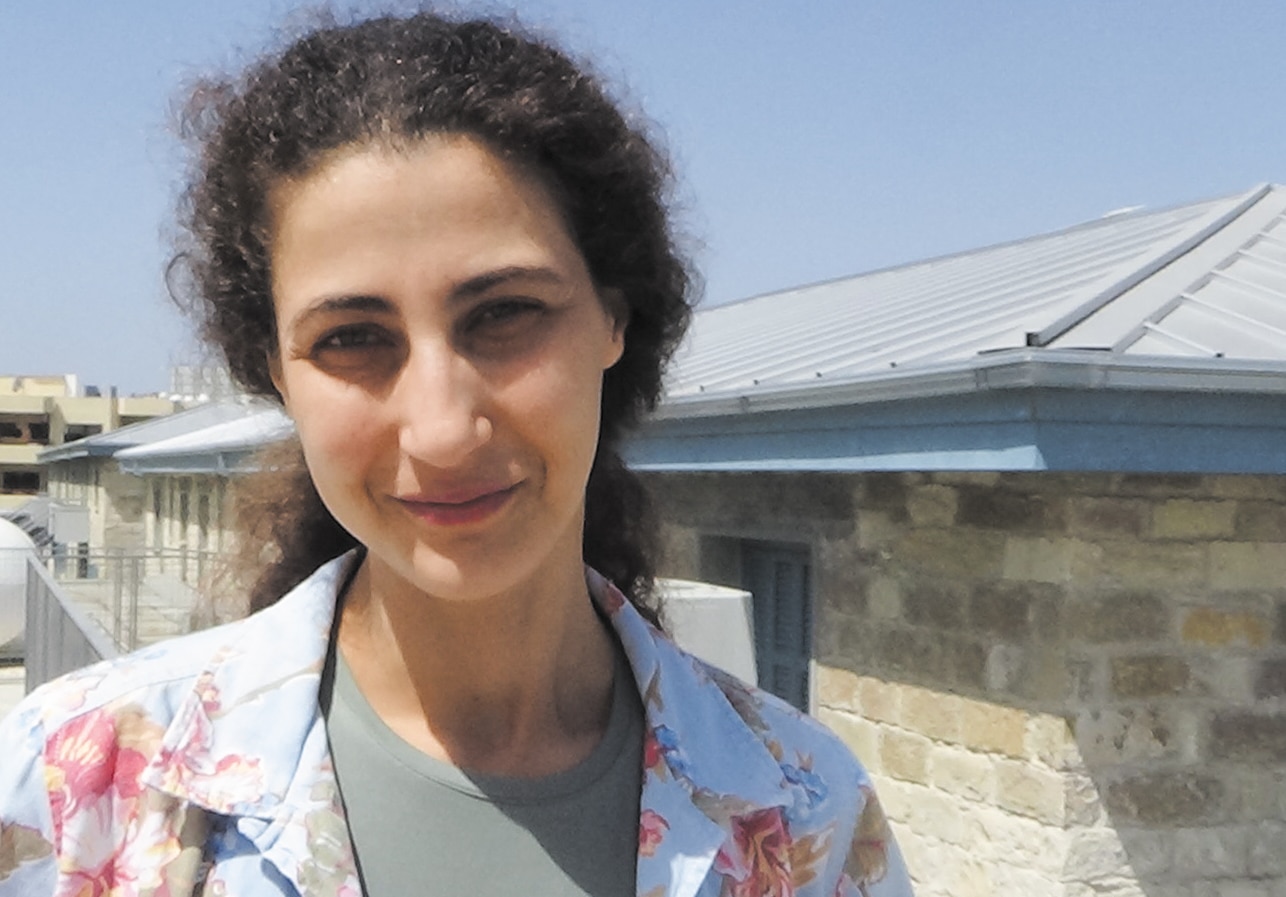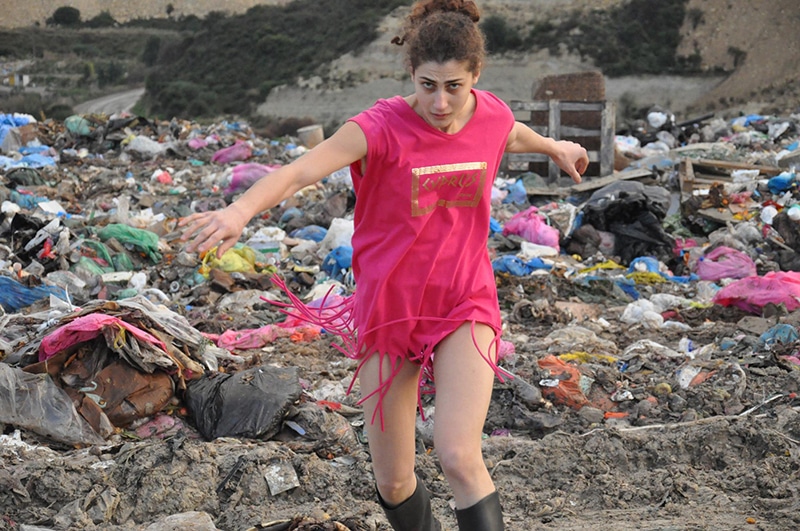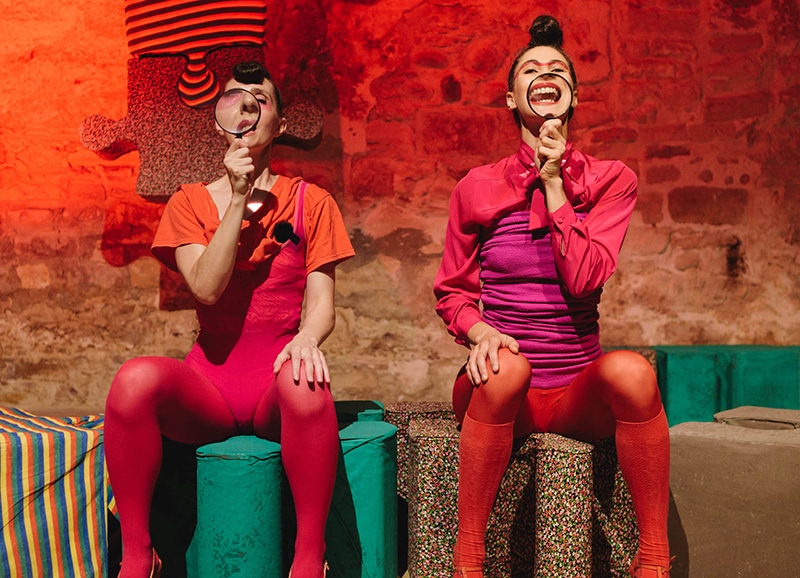In the driving force hoping to bring the European Capital of Culture to Limassol, THEO PANAYIDES finds a woman who loves numbers, and inviting the audience in to a performance
The two young women speak in unison: “I’ve been thinking,” they declaim, “about kissing”. This is Part 6: What does the tongue do?, a performance piece about “the act of kissing” that came out last year, produced by Bytheway Productions and performed as far afield as Chania in Crete. The taller of the two – dancer and choreographer Eleana Alexandrou, who also wrote the text – now sits opposite me in an air-conditioned conference room, explaining that she’s taking a break: not from kissing, but performance pieces. She’s the artistic director of Lemesos 2030, the city’s campaign to be named European Capital of Culture, a full-time job that’ll keep her off the stage till the end of next year at the earliest.
Our meeting place is also significant: the so-called Ploutis Servas Municipal Buildings, an assortment of offices devoted to social programmes abutted by a tranche of low-income housing. This is in the old Turkish Cypriot part of town, dotted with empty lots and auto repair shops – yet a mere 10 minutes’ walk from the self-conscious glitz of the marina, part of Limassol’s subtle identity crisis. At one point Eleana mentions her strategies for cheering herself up when she feels a bit down: “It’s very simple things. I will do laundry, or I’ll go out in the garden and trim plants!”. She laughs uproariously – she has a loud, delighted laugh – but in fact the real story here is that a 37-year-old artist can afford a house with a garden in today’s unaffordable Limassol. “I’m lucky,” she agrees, a little shamefacedly.

Going in, I wondered if we’d find a common language; dance, after all – especially contemporary dance, as opposed to ballet – is unique among the arts in being unmediated. There’s no canvas, no musical instrument, no story being told, no edifice being designed; it’s really just the dancer and their body. “It’s a combination,” she agrees, “of being quite accessible – because language is not a barrier, movement and physicality is a universal language – but at the same time it can be very abstract.” It’s easy for a dancer to become self-absorbed, lost in their art and acutely conscious of their every move. The rest of us, after all, take our body for granted – but dancers walk around with their professional kit, the source of their livelihood, 24/7. Is she extremely conscious of her own body?
“No!” she replies, hooting with laughter again. “I was always very – what’s the word, sloppy?… I’ve bumped into tree branches, poles, walls, doors, I don’t know how many times in my life. I zone out sometimes.” Nor is she especially careful with her diet; she’s a pescetarian, and will often detox (cutting out sugar and fried foods) for a week or so before a performance – but she also has chocolate every day, and not the healthy high-cocoa stuff either. Eleana doesn’t seem at all precious, hence presumably the desire to connect; Spirit is perhaps her most typical work in that regard, born of artistic generosity – inviting the audience in, like she says – and an egalitarian impulse “to have equal agency for the performer and the audience”.

On a photoshoot in 2013
The full, four-hour version was initially going to be live, forced online by Covid – but she also danced an earlier three-hour version herself, at the Buffer Fringe festival, answering questions while in motion (not an easy thing, she confirms). She had no red lines: “I will answer every question”, however personal. There was one rule, to prevent exhaustion more than anything: “If the music is loud, you cannot ask questions. If the music goes down, then it’s possible to ask questions”. The music was being played live by a collaborator, who could choose when to turn it up or down; “In general, I tried to create a space where everyone had freedom of choice” – and of course the audience too had a choice. They could choose to ruin the connection by asking inappropriate or silly questions – yet in fact the questions were thoughtful, even the personal ones. “Somebody asked me if I had regrets,” she recalls. “What are you afraid of?” asked another viewer. (That was later, in the performance during the pandemic.) “By the end of the three hours, I felt very connected to the people who were there. And they felt very close to me.”
So what is she afraid of?
She laughs, caught a little off guard. “I think I’m influenced by the recent events,” she replies carefully, meaning the vicious anti-migrant protest from about a week earlier. “I think I’m afraid of the capability of humans to go there – to go to violence… That provokes fear in me, the possibility of violence and how close it can get.”
And if I’d asked a few weeks ago, before the protest?
“Umm… Dying young!” she replies, with another big laugh.
It’s a joke, of course (or a semi-joke) – but there’s something there, especially for a dancer who feels growing older as a physical shock. “A friend of mine said once that it takes her a few minutes to get out of bed. I said to her ‘Why?’. She said ‘Wait till you’re 35’ – and it was true… It’s this thing with athletes also, if you work a lot with your body then you feel tired sooner”. Then there’s the stress of dancing itself – an act of creative (and physical) exhilaration, to be sure, but also a burden. Spirit was deeply influenced by the memory of her grandma, recalls Eleana; the grandma passed away during the project, having struggled for years with osteoporosis – a condition that evoked some awkward questions in her granddaughter. “Am I breaking my bones if I dance hard?” she recalls thinking – not as a rational question, perhaps, more a part of the constant dialogue between a dancer and her body. “Is it a dance for survival – or am I dancing to death?”
I thought dance was a celebration of the body?
“It’s also a celebration of the body. It’s a celebration of being alive.” That, above all, is why she cherished the experience of Spirit – because it tied the dancing to bigger things, relationships, connection. “This was not a dance to tell a story,” she explains, “and it was definitely not a dance to create beauty – yet there was beauty. Because there was something about the availability of the dancer as a whole person. Not just as a mover.”

What does the tongue do
What exactly is the ‘whole person’, when it comes to Eleana Alexandrou? For a start she’s a doer, a high achiever (“I don’t do holidays a lot”), a proverbial ‘good girl’, a top student from way back. “I was one of those people who wanted to be good at whatever they did,” she recalls, thinking back to her studies in accountancy (her mum, to whom she’s always been close, was also an accountant) – and she even worked at an audit firm for about a year, though she was never very happy about it. She’s also political, though not party-political – more in the same egalitarian impulse that created Spirit, the crucial thing for her being “how we perceive each other, in terms of having the same right to exist”.
After all, she says a bit surprisingly, “my mother’s closest friends were trans, and I grew up with them. And it was so – casual, let’s say, because it was part of my extended family. I only realised the discrimination when I became a teenager.” These were transwomen, what were known as ‘travesti’ or transvestites, i.e. cross-dressers: “I also used that word. I would talk to my friends and explain, it’s men who like to dress up as women. But now – no! They were trans, and it was the way they survived, this idea of explaining it like that.” Gender identity is one of her pet issues (she’s done a piece on the subject, In a Nutshell, conceived while doing a Master of Theatre degree in Amsterdam); political corruption is another, and she’s done a piece – at some point between the explosion in Mari and the first Anastasiades election – about that as well. “And animals also. I think it hurts me more than anything to see, or – to witness violence, or animals not being taken care of… These are strong things in me.”
There’s another aspect that ties it all together – the top grades, the egalitarian politics – and that, unexpectedly, is maths. Eleana has always loved numbers, and always been good at them (the accountancy came naturally; she still takes bookkeeping jobs for extra cash, especially doing the financials for other artists in EU programmes). If you placed all the dancer-choreographers in the world on a spectrum, she’d certainly be in the top percentile for most mathematically inclined – and one salient fact about maths is its strange duality. On the one hand, it’s a set of abstract equations that often seems locked in its own little bubble; on the other, it’s a practical, big-picture vision that literally explains the whole universe.
That duality exists in her own life too. On the one hand, the abstract art of dance; on the other, the practical idea of connection to the universe – the audience – beyond. On the one hand, her creative work as an artist; on the other, the organisational work with Lemesos 2030 and, earlier, Nea Kinisi, a union of sorts for dancers, choreographers and dance companies (she was president for six years, 2017-23) – the kind of big-picture jobs that allow you to see “how the community operates”. What does the tongue do? is an especially good example of this duality: “a zooming-in,” as she puts it, a kind of kissing manual, looking very technically at what makes a good kiss and a bad kiss (isn’t everyone different, though? “Actually, there are some rules!” she replies with another big laugh) – “but then, if I look at the idea of kissing from a distance, it was also about what does it mean to kiss a person, how do we choose the people we kiss? What part of us says ‘No’? What provokes that no?… Would you kiss a person if they throw garbage out of their car? Would you kiss someone that parks in a disabled parking space? – I was like, ‘No’. But what if your partner did, would you kiss them afterwards? Then it would be [a hesitant] ‘Y-yes’. Would you kiss Donald Trump? Would you kiss Erdogan?
“I definitely zoom in and out on a daily basis,” muses Eleana. “It’s just part of how I operate. I can easily sit down and just observe how I’ve positioned my hand on my leg, for example, and just watch that for a bit” – but then she can also get up and organise a performance piece from scratch (that’s the thing about being a dancer in a small place, you do your own budgets, write your own applications: “You learn to do a lot of things, not just dance”), or spearhead the Lemesos campaign from her office in the old Municipal Buildings. And meanwhile she’s also keeping fit, mindful of the havoc this ‘pause’ is likely to play with her dancer’s body, and tearing up and down mountains on enduro bikes (her new hobby) – and constantly bursting with ideas for new projects, though of course they’ll have to wait another year.
What kind of projects? The talk turns, again, to those stray moments of depression – “I can become very closed-up if I engage with my dark side” – and her strategies for dealing with them. Laundry works, trimming plants is good – but she’ll also hang out with her cats, she says (she has two), feline companionship being a great help with “pausing” for an over-active person like herself. “‘How to live like your cat’, that could be a motto.” It could even be her next project, I suggest – and Eleana laughs again, that delighted big laugh: “Yes! Actually I was planning to!… But yeah, it’ll happen later”. The choreographed lives of cats, zooming out from daily naps to feline Zen koans! Capital of culture, here we come.







Click here to change your cookie preferences